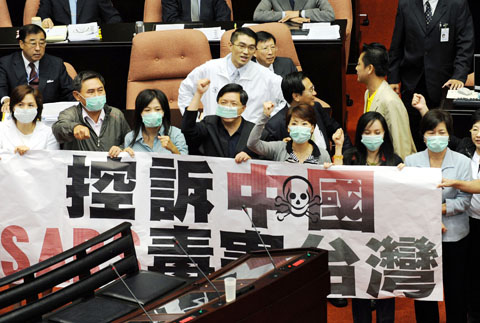Wearing surgical masks and displaying banners on the legislative floor, Democratic Progressive Party (DPP) legislators yesterday urged the government to disclose its intelligence and demand answers from Beijing, a day after National Security Bureau (NSB) Director Tsai Chao-ming (蔡朝明) accused China of starting the global SARS epidemic six years ago as part of a biological warfare campaign.
Tsai told a legislative committee on Monday that sources in China suspected biological warfare, but that conclusive evidence had not been found. SARS triggered a global health crisis after emerging in Guangdong Province in 2002, causing nearly 800 deaths worldwide, including 73 in Taiwan.
“The bureau listed it as a biochemical warfare agent,” Tsai said at the time in response to DPP Legislator Twu Shiing-jer (�?�) in the legislature’s Foreign and National Defense Committee. “We have evidence and we have asked UN experts to look into this.”

PHOTO: CNA
The NSB on Monday night issued a press statement saying that Tsai had been misunderstood. Tsai “expresses his sincere apology that his gaffe ... has caused misunderstanding and concerns,” it said.
When fielding questions from DPP lawmakers on the matter yesterday, Premier Liu Chao-shiuan (劉兆玄) said he believed Tsai simply misspoke.
“I never thought that there was a connection between SARS and biological warfare,” Liu said during the legislature’s question-and-answer session.
When asked by DPP Legislator Huang Wei-cher (黃偉哲) whether Tsai should resign if he indeed misspoke, Liu said that Tsai was not a member of the Cabinet but he would forward the opinion to President Ma Ying-jeou (馬英九).
Minister of the Department of Health Yeh Chin-chuan (葉金川) said that “there is very little chance that the SARS virus could be used as a biological weapon now.”
“It’s a different situation now than it was five years ago. As we are now 100 percent sure how to treat the SARS virus, there is very little possibility of SARS becoming an epidemic,” Yeh said.
“In the past, it took seven days to identify the SARS virus, but now we just need two hours,” he said.
Yeh’s remarks drew criticism from DPP lawmakers who accused Yeh of taking China’s side.
DPP spokesman Cheng Wen-tsang (鄭文燦) told a press conference yesterday that if the SARS virus were to be used as a bioweapon, it would cause irreparable harm to mankind. Cheng appealed to the international community and the UN to investigate the case “because the Chinese move would cause a terrible global disaster.”
At a separate setting, DPP caucus whip William Lai (賴清德) said that if the NSB had found evidence China was behind the use of the SARS virus as a biochemical weapon, the government should represent Taiwanese SARS victims by asking for compensation from China.
Meanwhile, Chinese Nationalist Party (KMT) Legislator Wu Yu-sheng (吳育昇) and Luo Shu-lei (羅淑蕾) yesterday both urged Tsai to call a press conference in person to clear up his remark.
“Just issuing press statements [as a correction] was not enough. Tsai has to step down if he fails to show evidence for his claim,” Wu said.
KMT Legislator Chang Sho-wen (張碩文) said that Tsai’s accusation was part of a DPP plot to thwart the planned visit by Association for Relations Across the Taiwan Strait (ARATS) Chairman Chen Yunlin in the near future.
ADDITIONAL REPORTING BY RICH CHANG

A magnitude 7.0 earthquake struck off Yilan at 11:05pm yesterday, the Central Weather Administration (CWA) said. The epicenter was located at sea, about 32.3km east of Yilan County Hall, at a depth of 72.8km, CWA data showed There were no immediate reports of damage. The intensity of the quake, which gauges the actual effect of a seismic event, measured 4 in Yilan County area on Taiwan’s seven-tier intensity scale, the data showed. It measured 4 in other parts of eastern, northern and central Taiwan as well as Tainan, and 3 in Kaohsiung and Pingtung County, and 2 in Lienchiang and Penghu counties and 1

FOREIGN INTERFERENCE: Beijing would likely intensify public opinion warfare in next year’s local elections to prevent Lai from getting re-elected, the ‘Yomiuri Shimbun’ said Internal documents from a Chinese artificial intelligence (AI) company indicated that China has been using the technology to intervene in foreign elections, including propaganda targeting Taiwan’s local elections next year and presidential elections in 2028, a Japanese newspaper reported yesterday. The Institute of National Security of Vanderbilt University obtained nearly 400 pages of documents from GoLaxy, a company with ties to the Chinese government, and found evidence that it had apparently deployed sophisticated, AI-driven propaganda campaigns in Hong Kong and Taiwan to shape public opinion, the Yomiuri Shimbun reported. GoLaxy provides insights, situation analysis and public opinion-shaping technology by conducting network surveillance

Taiwan is gearing up to celebrate the New Year at events across the country, headlined by the annual countdown and Taipei 101 fireworks display at midnight. Many of the events are to be livesteamed online. See below for lineups and links: Taipei Taipei’s New Year’s Party 2026 is to begin at 7pm and run until 1am, with the theme “Sailing to the Future.” South Korean girl group KARA is headlining the concert at Taipei City Hall Plaza, with additional performances by Amber An (安心亞), Nick Chou (周湯豪), hip-hop trio Nine One One (玖壹壹), Bii (畢書盡), girl group Genblue (幻藍小熊) and more. The festivities are to

Auckland rang in 2026 with a downtown fireworks display launched from New Zealand’s tallest structure, Sky Tower, making it the first major city to greet the new year at a celebration dampened by rain, while crowds in Taipei braved the elements to watch Taipei 101’s display. South Pacific countries are the first to bid farewell to 2025. Clocks struck midnight in Auckland, with a population of 1.7 million, 18 hours before the famous ball was to drop in New York’s Times Square. The five-minute display involved 3,500 fireworks launched from the 240m Sky Tower. Smaller community events were canceled across New Zealand’s